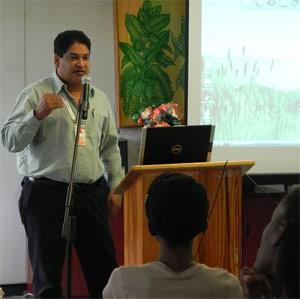|
January 2011

Issue Home >>
|
Testing, Testing 123: HIV infection rate has not dropped
 Dr Neil Singh, Student Medical Officer/Head Health Services Unit, at the Campus, made a presentation titled, “Testing, Testing 123” in which he made the point that HIV is like any other chronic illness for which you receive treatment and attend clinics, like diabetes and cancer. Dr Neil Singh, Student Medical Officer/Head Health Services Unit, at the Campus, made a presentation titled, “Testing, Testing 123” in which he made the point that HIV is like any other chronic illness for which you receive treatment and attend clinics, like diabetes and cancer.
HIV/AIDS a Regional and Local Analysis: Where are we now? Where are we headed? This was the topic of discussion among students of the UWI, St. Augustine at a programme held in November 2010. The programme to mark World AIDS Day, was organized by The Psychology Seminar Series: A Meeting of Minds, in collaboration with The UWI Guild of Students. Led by postgraduate students, Rosana Yearwood and Jannel Philip, and supported by their supervisor, Dr. Derek Chadee, it was designed to generate interaction, reflection and action.
Opening discussions examined the question, The HIV/AIDS epidemic 30 years later – Why?
From the audience, the president of Post Graduate Association, Aduke Williams, suggested that the HIV epidemic persists because we feel detached and personally unaffected by the HIV/AIDS and do not think we can contract the virus.
A brief historical overview and global perspective on the epidemic provided the context for more focussed attention on the regional and local analysis. Jannel Philip conducted this segment, referring to recent news articles and reports which indicate that progress on HIV/AIDS in the Caribbean has stalled, and that in Trinidad and Tobago there is a steady rate of HIV infection.
“Do you know someone with HIV?” she asked, pointing out that, based on trends, within three years the HIV virus would be closer home; someone in our family or among our close friends may be affected.
The discussion turned to vulnerability, with statistics showing that in the Caribbean, women account for 50% of those living with HIV. In Trinidad and Tobago, among the 15-34 age group, the number of new HIV infections among females is more than twice that for males. Students’ contributions suggested that the most vulnerable are those who are sexually active as well as those with low bargaining power: children and women.
The discussions on vulnerability paved the way for the main speaker, Dr Neil Singh’s presentation titled, “Testing, Testing 123.” Dr. Singh, Student Medical Officer/Head Health Services Unit, at the Campus, began with the point that HIV is like any other chronic illness for  which you receive treatment and attend clinics, like diabetes and cancer. He covered a wide range of issues such as risky sexual behaviours, alcohol and risk for HIV, sexually transmitted infections, HIV testing options, timing and frequency, and sexual health services. He encouraged HIV testing and challenged those whose status is HIV negative to remain positively negative. He emphasized that HIV is not a death sentence; and if one’s status is HIV positive, be positively positive, seek treatment and live responsibly. which you receive treatment and attend clinics, like diabetes and cancer. He covered a wide range of issues such as risky sexual behaviours, alcohol and risk for HIV, sexually transmitted infections, HIV testing options, timing and frequency, and sexual health services. He encouraged HIV testing and challenged those whose status is HIV negative to remain positively negative. He emphasized that HIV is not a death sentence; and if one’s status is HIV positive, be positively positive, seek treatment and live responsibly.
Mr Roger McLean, a lecturer from the Health Economic Unit, Centre for Health Economics, Economics Department and a member of regional organizations, Pan Caribbean Partnership against HIV/AIDS (PAN CAP) and University of the West Indies HIV/AIDS Response Programme (UWI HARP), said that discrimination is an impractical approach to the issue, in that we prevent persons with HIV/AIDS from becoming members of the economically active population at our own expense. We ultimately bear the financial burden of our decision to be “apart from” HIV/AIDS. He pointed out that we make it hard for these people when we shun casual contact; when we do not allow them to work; when we do not patronize a restaurant where they are employed. We are the ones making it hard for people to get tested and treated; we are the ones hindering the HIV prevention strategies. Until and unless we see ourselves as part of the community of PLHIV we would be the ones responsible for the epidemic lingering after 30 years.
Rosana Yearwood closed the programme with “Call to Action – What can U do What can WI do?”
–World AIDS Day is recognized on Dec 1 every year. For students at The UWI, St. Augustine Campus, HIV testing is free and confidential. Visit or call the Health Services Unit at 662-2002 for an appointment.
|





